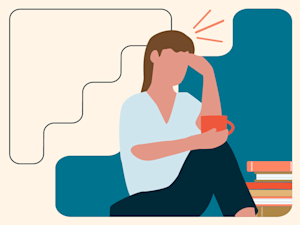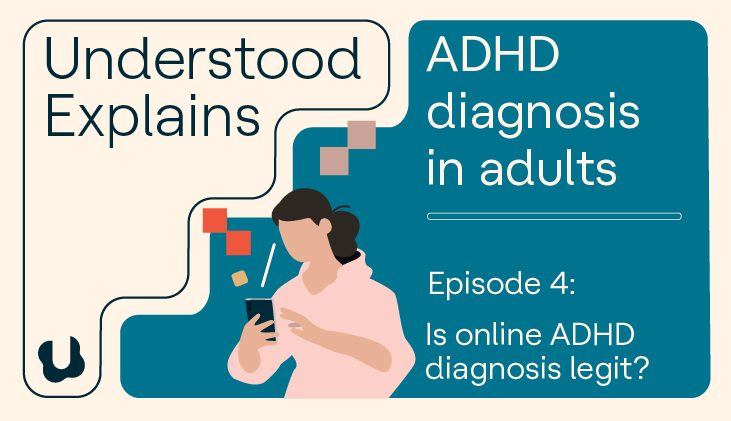Stay in the know
All our latest podcasts delivered right to your inbox.
The wait time may be shorter, but is online ADHD diagnosis accurate? And can it help you get ADHD treatment? In this episode of Understood Explains, learn the pros and cons of ADHD online diagnosis and get answers to common questions:
What are online ADHD diagnoses? [00:49]
Is online ADHD diagnosis legit? [02:53]
Does online ADHD testing cost a lot less than conventional testing? [06:16]
Any other concerns about online ADHD diagnosis? [07:18]
Key takeaway, next episode, and credits [09:05]
Related resources
Episode transcript
You’re listening to Season 2 of Understood Explains: ADHD Diagnosis in Adults.
Today’s episode covers a very hot topic: online ADHD diagnosis.
My name is Dr. Roberto Olivardia, and I’m a clinical psychologist with more than 20 years of experience evaluating people for things like ADHD. I’m also one of the millions of people who have been diagnosed with ADHD as an adult. I’ll be your host.
My goal here is to answer the most common questions about ADHD diagnosis. Along the way, you’ll learn a lot about ADHD in general.
We’re going to do this quickly — in the next 10 or so minutes. So, let’s get to it.
What are online ADHD diagnoses? [00:49]
Before we get into the legitimacy of online ADHD diagnoses, I want to differentiate between two common types of online testing and explain what they do.
First, there are the quizzes or “screeners.” If you type in a search engine “Do I have ADHD?,” you’ll pull up a gazillion sites that have quick quizzes. But their goal isn’t to diagnose you with ADHD. It’s to give you a sense of whether you should get more rigorous testing.
Now, it’s very common for primary care providers to ask a few quick questions to “screen” patients to see if they need more formal testing for Condition X, Y, or Z. But it’s only fairly recently that these screener-type questions have jumped from something you’d do in a doctor’s office to something you could do on a website at 3 a.m.
You can find some very good screener-type quizzes for free online. You can also find some really crappy ones.
But no matter how good or reputable the source is, it’s important to know that a super-short ADHD test or quiz should just be a starting point. For example, if the quiz results say you’re likely to have ADHD, that doesn’t mean you actually have it. It might mean you should go see a professional to get formally tested.
And if the quiz results say the opposite — that you aren’t likely to have ADHD — that doesn’t mean you for sure don’t have it. Maybe the quiz isn’t asking enough questions or isn’t asking the right questions. A 10-question quiz is a teeny, tiny bit of data. You need a lot more information to get a diagnosis.
Now, moving on from the realm of super-quick quizzes … there are also sites that say they can formally diagnose you with ADHD. And these sites tend to take one of two paths:
Some include a face-to-face meeting with a licensed psychologist in a video call.
Other sites may only have a questionnaire you fill out on your own, without any one-on-one interactions with a provider.
So the big-picture summary here is that some online evaluations may be OK, and some may be way too skimpy.
Is online ADHD diagnosis legit? [02:53]
So I want to start off with a big note of caution here. I can definitely see how it might be appealing to go with a company that offers 24/7 diagnosis — especially for folks who are really eager to start getting treated as soon as possible. But I also want to be clear that I do not recommend getting a diagnosis unless it involves spending a good amount of time with a specialist that fits the criteria we covered in Episode 2.
OK, so now that I've gotten that out in the open, I want to cover some of the reasons why folks may be interested in this — and also why I’m urging caution here.
One reason people might be attracted to an online diagnosis is because they believe it’ll get them evaluated sooner than if they waited to see a specialist in person.
Your wait time might be shorter. But that also raises the question of why is the wait so short? It could mean that the website is churning out evaluations too quickly without being thorough enough to provide quality care.
I’d be very cautious about a company that suggests it can evaluate most adults in a single hour-long visit.
Another reason people may be drawn to online diagnosis is that you don’t need to leave home, or even change out of your pajamas.
And speaking of not wanting to get out of your pj’s, this is a good place for me to mention that ADHD can make it hard to take action, even if the result is something you really want or need — especially if taking action seems like it involves a lot of steps, like making an appointment, getting dressed, going to the doctor’s office, etc.
But wanting simplicity or convenience doesn’t mean you need to reduce the quality of your health care. So many conventional providers like me offer telehealth visits, so it’s very feasible to have face time with a provider while you’re at home.
And then there’s cost. An online evaluation that is totally asynchronous — meaning there is no one-on-one telehealth visit — is likely to be less expensive than conventional testing. But this could come at a huge cost to your well-being.
Face-to-face time with a provider is so, so crucial. And I have three reasons for urging so much caution about this. And those three reasons are three of my patients, who I’m going to call Luke, Leia, and Han — because who doesn’t like a Star Wars reference? 😆
Luke and Leia were both diagnosed online without speaking to anyone one-on-one. And Han was diagnosed online after a short video call with a provider.
Luke was misdiagnosed with ADHD, when what he really had was obsessive-compulsive disorder, or OCD. He was prescribed ADHD stimulants that unfortunately had the effect of dramatically exacerbating his OCD symptoms.
Leia was also misdiagnosed with ADHD, when the real root of the problem is that she was engaging in drug-seeking behavior for an addiction to amphetamines.
Meanwhile, Han did get to speak with a provider for a little bit, but there was no screening for other mental health issues. So although he did actually have ADHD, he also had bipolar disorder, which was missed by the online evaluation.
I am glad, relieved, you name it, that Luke, Leia, and Han eventually started getting the support they need. But their experiences are just some of the many reasons why I am very suspicious of any site that advertises quick, same-day assessments.
Does online ADHD testing cost a lot less than conventional testing? [06:16]
I know it’s common for a lot of folks to assume that it will cost an arm and a leg to speak to a professional.
But if you have insurance, then your only cost may be the co-pay to see a doctor who’s “in network.” That co-pay will likely be less costly than paying for an online assessment if it isn’t covered by your insurance.
And if you don’t have insurance, try calling a college or university near you that has a graduate program in clinical psychology. These programs tend to have free or low-cost clinics where you’d be evaluated by a grad student who is being closely supervised by an expert.
You will no doubt have to wait longer to see someone in person than if you go to a website that does same-day assessments. But it may be well worth your time to wait several weeks or even months to get a thorough evaluation so you can get an accurate diagnosis. As with any health care decision, talk with your primary care provider to help decide what’s best for you.
Any other concerns about online ADHD diagnosis? [07:18]
Coming back to the Luke, Leia, and Han examples I just shared, the biggest issue with an online evaluation is that it probably won’t be comprehensive. It’ll most likely be very focused on ADHD. And that can be a problem because there are a lot of things that can look like ADHD — such as anxiety or depression.
So if you get an online evaluation that is very focused on ADHD, you might come out of it getting misdiagnosed with ADHD. This can be dangerous in some cases. For example — and, just as a warning, this is gonna be a very heavy example — if the source of your ADHD-like symptoms is actually bipolar disorder, and you start taking an ADHD stimulant medication, it might trigger a manic or psychotic episode, and possibly increase suicidal thinking or ideation.
Another thing to keep in mind about an evaluation that is narrowly focused on ADHD is that you might be told you’re showing signs of — and I’m doing air quotes here — “something other than ADHD,” and that you need to go elsewhere to find out what that “something” is.
The other huge area of concern about an online ADHD diagnosis is that it might not get you the help you need.
For example, some websites or apps can diagnose people anywhere in the U.S., but can only provide treatment in certain states. So depending on where you live, you might need to go to a different provider to get treatment.
And it’s also important to know that federal regulators are taking a close look at online prescriptions in general. In 2023, the U.S. Drug Enforcement Administration announced it may start requiring at least one in-person visit to get a new prescription or a refill for ADHD medications.
Key takeaway, next episode, and credits [09:05]
OK, listeners, that’s it for Episode 4. If there’s one thing I want you to take away from this episode it’s that…
I do not recommend getting a diagnosis without speaking to a live person on video or telephone. Getting misdiagnosed can be dangerous. So, please remember that.
The other big thing to remember is that if you’re speaking to an ADHD specialist who has the kind of training that we discussed in Episode 2 — and who is asking a wide range of questions to help figure out if you have ADHD or something else — an online diagnosis could be quicker and may be less expensive. But there may be more steps involved if the site where you got the diagnosis isn’t allowed to provide treatment in your state.
So stay focused on the ultimate goal. You want to figure out what’s really going on so you can start to get the support you need to feel better and to function better in all aspects of your life.
Thanks for listening, and I hope you’ll join me for Episode 5, which explains what you need to know about ADHD medication, whether you’re eager to start taking it or you’re worried about taking it.
You’ve been listening to Season 2 of Understood Explains from the Understood Podcast Network. If you want to learn more about the topics we covered today, check out the show notes for this episode. We include more resources, as well as links to anything we’ve mentioned in the episode.
One important note: I don’t prescribe ADHD medication and I don’t have any affiliation with pharmaceutical companies — and neither does Understood. This podcast is intended solely for informational purposes and is not a substitute for a professional diagnosis or for medical advice or treatment. Talk with your health care provider before making any medical decisions.
Understood Explains is produced by Julie Rawe and Cody Nelson, who also edited the show. Briana Berry is our production director. Our theme music was written by Justin D. Wright, who also mixes the show.
For the Understood Podcast Network, Laura Key is our editorial director, Scott Cocchiere is our creative director, and Seth Melnick is our executive producer.
Understood is a nonprofit organization dedicated to helping people who learn and think differently discover their potential and thrive. Learn more at understood.org/mission.
Host

Roberto Olivardia, PhD
is an expert in the treatment of ADHD, obsessive-compulsive disorder, and body dysmorphic disorder. He also focuses on issues facing students with learning disabilities.
Latest episodes

March 22, 2023
Listen to the trailer for Season 2 of “Understood Explains,” which explains ADHD diagnosis in adults — from getting tested to finding support.

March 29, 2023
Wondering if you have enough ADHD symptoms? If it’s worth the effort to get tested? Host Dr. Roberto Olivardia shares his own adult diagnosis story.

March 29, 2023
Find out which types of health care providers can diagnose ADHD in adults — if it’s worth the wait to see a certain kind of specialist.

March 29, 2023
Find out how doctors test adults for ADHD. What kind of questions do they ask? How long does it take? Know what to expect in a thorough evaluation.

March 29, 2023
How does ADHD medication work? Is it addictive? Get answers to common questions, like how to tell if you’re taking too much or too little.

March 29, 2023
There are many ways to treat ADHD without medication or in addition to medication. Learn about options ranging from behavior therapy to free apps.

March 29, 2023
Relief. Anger. Grief. Learn about common reactions to getting diagnosed with ADHD and how to process these feelings so you can keep moving forward.

March 29, 2023
Doubting the accuracy of your ADHD diagnosis? Find out how to tell if you got a thorough evaluation and if you might need a second opinion.

March 29, 2023
Listen to personal stories about adult ADHD diagnosis. Find out what led each person to get diagnosed and what they wish they’d known sooner.
